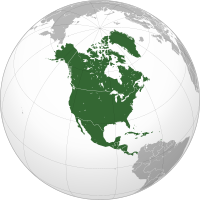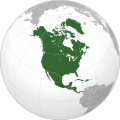Portal:North America
The North America Portal

North America is a continent in the Northern and Western Hemispheres. North America is bordered to the north by the Arctic Ocean, to the east by the Atlantic Ocean, to the southeast by South America and the Caribbean Sea, and to the west and south by the Pacific Ocean. The region includes the Bahamas, Bermuda, Canada, the Caribbean, Central America, Clipperton Island, Greenland, Mexico, Saint Pierre and Miquelon, Turks and Caicos Islands, and the United States.
North America covers an area of about 24,709,000 square kilometers (9,540,000 square miles), representing approximately 16.5% of the Earth's land area and 4.8% of its total surface area. It is the third-largest continent by size after Asia and Africa, and the fourth-largest continent by population after Asia, Africa, and Europe. , North America's population was estimated as over 592 million people in 23 independent states, or about 7.5% of the world's population. In human geography, the terms "North America" and "North American" sometimes refer to just Canada, the United States, Mexico, and Greenland.
It is unknown with certainty how and when first human populations first reached North America. People were known to live in the Americas at least 20,000 years ago, but various evidence points to possibly earlier dates. The Paleo-Indian period in North America followed the Last Glacial Period, and lasted until about 10,000 years ago when the Archaic period began. The classic stage followed the Archaic period, and lasted from approximately the 6th to 13th centuries. Beginning in 1000 AD, the Norse were the first Europeans to begin exploring and ultimately colonizing areas of North America.
In 1492, the exploratory voyages of Christopher Columbus led to a transatlantic exchange, including migrations of European settlers during the Age of Discovery and the early modern period. Present-day cultural and ethnic patterns reflect interactions between European colonists, indigenous peoples, enslaved Africans, immigrants from Europe, Asia, and descendants of these respective groups. (Full article...)
The Colorado River (Spanish: Río Colorado) is one of the principal rivers (along with the Rio Grande) in the Southwestern United States and in northern Mexico. The 1,450-mile-long (2,330 km) river, the 5th longest in the United States, drains an expansive, arid watershed that encompasses parts of seven U.S. states and two Mexican states. The name Colorado derives from the Spanish language for "colored reddish" due to its heavy silt load. Starting in the central Rocky Mountains of Colorado, it flows generally southwest across the Colorado Plateau and through the Grand Canyon before reaching Lake Mead on the Arizona–Nevada border, where it turns south toward the international border. After entering Mexico, the Colorado approaches the mostly dry Colorado River Delta at the tip of the Gulf of California between Baja California and Sonora.
Known for its dramatic canyons, whitewater rapids, and eleven U.S. National Parks, the Colorado River and its tributaries are a vital source of water for 40 million people. An extensive system of dams, reservoirs, and aqueducts divert almost its entire flow for agricultural irrigation and urban water supply. Its large flow and steep gradient are used to generate hydroelectricity, meeting peaking power demands in much of the Intermountain West. Intensive water consumption has dried up the lower 100 miles (160 km) of the river, which has rarely reached the sea since the 1960s. (Full article...)
Ann Weldy (born September 15, 1932), better known by her pen name Ann Bannon, is an American author who, from 1957 to 1962, wrote six lesbian pulp fiction novels known as The Beebo Brinker Chronicles. The books' enduring popularity and impact on lesbian identity has earned her the title "Queen of Lesbian Pulp Fiction". Bannon was a young housewife trying to address her own issues of sexuality when she was inspired to write her first novel. Her subsequent books featured four characters who reappeared throughout the series, including her eponymous heroine, Beebo Brinker, who came to embody the archetype of a butch lesbian. The majority of her characters mirrored people she knew, but their stories reflected a life she did not feel she was able to live. Despite her traditional upbringing and role in married life, her novels defied conventions for romance stories and depictions of lesbians by addressing complex homosexual relationships.
Her books shaped lesbian identity for lesbians and heterosexuals alike, but Bannon was mostly unaware of their impact. She stopped writing in 1962. Later, she earned a doctorate in linguistics and became an academic. She endured a difficult marriage for 27 years and, as she separated from her husband in the 1980s, her books were republished; she was stunned to learn of their influence on society. They were released again between 2001 and 2003 and were adapted as an award-winning Off-Broadway production. They are taught in women's and LGBT studies courses, and Bannon has received numerous awards for pioneering lesbian and gay literature. She has been described as "the premier fictional representation of US lesbian life in the fifties and sixties", and it has been said that her books "rest on the bookshelf of nearly every even faintly literate Lesbian". (Full article...)
Did you know...
- ...that the CIA began to recruit and train anti-Castro forces for the Bay of Pigs Invasion in the Sierra Madre mountains on the Pacific coast of Guatemala?
- ...that Calico Jack (pictured), an English pirate captain during the early 18th century, was executed with most of his crew in Jamaica on 17 November 1720?
- ...that Pico Turquino in the Sierra Maestra mountains is the highest point in Cuba at 6,749 feet?
- ... that the oldest winery in The Americas is in Parras de la Fuente?
- ... that during the Dead Rabbits Riot of 1857, residents of Mulberry Street in New York City were forced to barricade themselves in their homes?
Selected panorama

Topics
Categories
List articles
Related portals
Northern America
Central America
Caribbean
WikiProjects
 North America
North America-
 Canada
Canada -
 Greenland
Greenland -
 Mexico
Mexico -
 Saint Pierre and Miquelon
Saint Pierre and Miquelon -
 United States
United States  Central America
Central America-
 Belize
Belize -
 Costa Rica
Costa Rica -
 El Salvador
El Salvador -
 Guatemala
Guatemala -
 Honduras
Honduras -
 Nicaragua
Nicaragua -
 Panama
Panama  Mesoamerica
Mesoamerica Caribbean
Caribbean-
 Antigua and Barbuda
Antigua and Barbuda -
 Bahamas
Bahamas -
 Barbados
Barbados -
 Bermuda
Bermuda -
 Cuba
Cuba -
 Dominica
Dominica -
 Dominican Republic
Dominican Republic -
 Grenada
Grenada -
 Haiti
Haiti -
 Jamaica
Jamaica -
 Puerto Rico
Puerto Rico -
 Saint Kitts and Nevis
Saint Kitts and Nevis -
 Saint Lucia
Saint Lucia -
 Saint Vincent and the Grenadines
Saint Vincent and the Grenadines -
 Trinidad and Tobago
Trinidad and Tobago
Associated Wikimedia
The following Wikimedia Foundation sister projects provide more on this subject:
-
Commons
Free media repository -
Wikibooks
Free textbooks and manuals -
Wikidata
Free knowledge base -
Wikinews
Free-content news -
Wikiquote
Collection of quotations -
Wikisource
Free-content library -
Wikiversity
Free learning tools -
Wikivoyage
Free travel guide -
Wiktionary
Dictionary and thesaurus



























